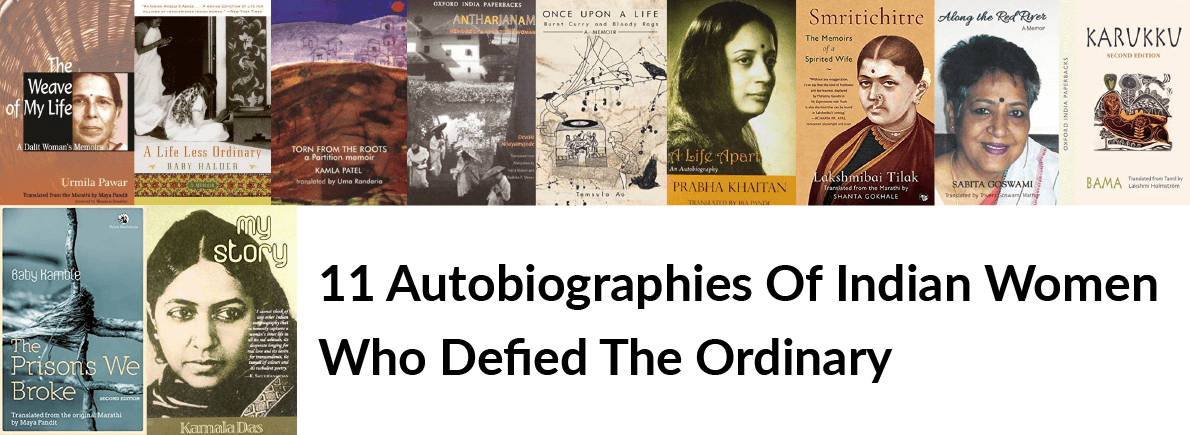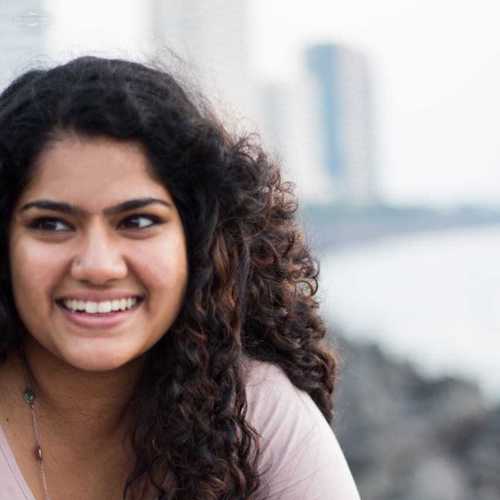
Women’s autobiographies are tools of self-representation of their personal histories. Women from the margins have used them to represent their realities and their feminist concerns. Their autobiographies have defied the set norms of language and aesthetics and have instead moulded them to speak of lives that have broken out of the ordinary. Almost all the autobiographies on this list have been translated to English from their original languages, thereby highlighting the importance of translations in bringing marginalised voices in literature to readers.
As the world celebrates Women’s History Month throughout March, it is time we took a closer look at some of the personal histories that highlight the contribution of women in shaping history, culture and society.
01
Smritichitre: The Memoirs Of A Spirited Wife
Laksmibai Tilak, Shanta Gokhale (Tr.)
Lakshmibai Tilak was born into a Maharashtrian Brahmin family and was married at the age of 11 to Narayan Waman Tilak, a famous poet who was much older than her. In Smritichitre: The Memoirs Of A Spirited Wife, Tilak frankly recounts the challenges she faced in her marriage with her husband’s conversion to Christianity and their ensuing separation for five years. Later, under his guidance, she begins to slowly convert to Christianity and get more absorbed into his community service. She was, as the title suggests, a spirited wife, and this can be seen in her bold choice of missionary work with victims of the plague. She came into her own post the death of her husband and became the matron of a girls’ hostel. First published in 1934, the book instantly became a classic with its witty humour, narrated in simple Marathi.
Buy it here.
02
The Weave Of My Life: A Dalit Woman’s Memoirs
Urmila Pawar, Maya Pandit (Tr.)
In The Weave Of My Life: A Dalit Woman’s Memoirs, Urmila Pawar tells the story of three generations of Mahar women. The Dalit autobiography is not just an individual narrative but weaves together the issues and oppression faced by the community based on their caste and gender. Pawar, through her activism, also talks about the lack of space within the larger feminist movement for the feminist concerns of the Dalit women. The language used in the book is often shocking and raw. It brings to literature a representation of Dalit food and customs. It also highlights the ways in which the community has changed over the years but continues to remain affected by the pervasive nature of the caste system.
Buy it here.
03
A Life Less Ordinary
Baby Halder, Urvashi Butalia (Tr.)
Baby Halder’s childhood was cut prematurely short when her mother walked out of the marriage due to her father’s long absences from home, tasking Baby and her sister with the responsibility of managing the home. This led to her being hurriedly married off at the age of 12 and becoming a mother by 14. The instability in her life continued as she bore the brunt of violence at the hands of her husband, only escaping years later with her three children to find work in Delhi. Working as a domestic help in Delhi, Baby was finally fortunate to find a mentor in her employer, one who encouraged her to read and later, to write about her journey. Originally published in Hindi, the resulting book became an instant bestseller with its simplistic style and honest narration that echoed her courage and will to survive.
Buy it here.
04
Once Upon A Life: Burnt Curry And Bloody Rags
Temsula Ao
Born in Jorhat, Assam in 1945, Temsula Ao’s happy childhood was ripped apart by the sudden loss of both parents, leaving her and her five sisters orphaned. In her autobiography, she unfolds the stories of her childhood, her time at boarding school and the impact of Christian missionaries on her life. She charts her courageous journey, through humorous anecdotes, of overcoming the obstacles of poverty to build a distinguished teaching career, serving as the Director of the Northeast Zone Cultural Centre and finally, as the Dean of the School of Humanities and Education, North-Eastern Hill University, Shillong. A feminist memoir, the narrative gives us an insight into her active role as a poet, author and leading figure of the Northeast.
Buy it here.
05
My Story
Kamala Das
Kamala Das’ path-breaking autobiography My Story tracks the fearless way she chose to live her life by defying set conventions. A feminist classic, this book was well ahead of its times, and garnered a cult following due to its outspoken and controversial revelations. Originally written in Malayalam, titled Ente Katha, it is considered to be a best-selling Indian woman’s autobiography even today. The inclusion of her poems as epigraphs give the reader an insight into Das as a poet. She was nominated for the Nobel Prize for Literature in 1984.
Buy it here.
06
Torn From The Roots: A Partition Memoir
Kamala Patel, Uma Randeria (Tr.)
In this memoir, Kamala Patel gives a first-hand account of Operation Recovery, conducted by the governments of Pakistan and India to recover abducted women on both sides of the border post the Partition. She boldly captures the aftermath of the violence during the three years that she spent in Pakistan and in the camps that she ran for the recovered women in Amritsar, Lahore and Jalandhar. The stories in her memoir expose the harsh realities of the camps where the women were often transactionally exchanged and the hard-to-stomach stories of the lives she saved. Her autobiography serves as an archive of the lives and experiences of the affected women during one of the largest human migrations in history.
Buy it here.
07
The Prisons We Broke
Baby Kamble, Maya Pandit (Tr.)
Baby Kamble draws a graphic revelation into the inner world of the Mahar community, tracing its history from before the impact of Babasaheb Ambedkar’s philosophy. Published in 1986, Baby Kamble’s Jina Amucha was the first autobiography by a Dalit woman in Marathi. However, it was only translated into English in 2008 by Maya Pandit and titled The Prisons We Broke. Through this work, Kamble redefined the form of autobiographical writing in Marathi and used it to go beyond the personal narrative in order to create a document that represented the social and political history of the Mahar community. Her book unapologetically voices a feminist critique of the treatment of women in the Mahar community while also protesting against Brahmanical oppression.
Buy it here.
08
Karukku
Bama, Lakshmi Holmstrom (Tr.)
Written in 1992, Karukku is the first autobiography written by a Dalit woman in Tamil. The Tamil publishing industry found her language unacceptable, so Bama Faustina published the work privately after leaving the convent. Her narration is not linear. This is noted in the manner in which she grapples with her intersecting identities of being a Dalit, a Christian and a woman. She faced humiliation and discrimination within the education system that made it harder for her to pursue a course of study, one that she could already barely afford. The book deals with the caste oppression present within the Catholic Church and her struggle to leave the convent. She wrote this autobiography to recover from the betrayal of the institution she’d expected support from, and as a form of self-reflection.
Buy it here.
09
Antharjanam: Memoirs of a Namboodiri Woman
Devaki Nilayamgode, Indira Menon (Tr.) & Radhika P. Menon (Tr.)
Antharjanam is the first full-length account into the life of a Namboodiri woman.
Here, Devaki Nilayamgode walks the reader through her memories of the traditions and indigenous systems of a community that is now long gone. The book serves to archive the change of the community’s agricultural stronghold and the erosion of its unquestioned wealth and social power. Told without any self-pity, Nilayamgode writes a personal and social history at a time when the community was almost at the end of its era. The reader gets to know of the daily routine, the rituals and the strict customs that the women had to follow. Nilayamgode recounts the memories in simple conversational Malayalam.
Buy it here.
10
Along The Red River: A Memoir
Sabita Goswami, Triveni Goswami Mathur (Tr.)
In her memoir, Sabita Goswami, a veteran BBC and Associated Press journalist, details her extraordinary fight and the social obstacles that she faced as she established herself professionally in the heart of Assam. She documents three decades of the volatile political climate in Assam, with insights into the social and political history of the region. Her narration is unbiased and fearless and gives the reader an insight into the historical context of Assam’s contemporary problems. The book has been translated from Assamese by her daughter, Triveni Goswami Mathur.
Buy it here.
11
A Life Apart
Prabha Khaitan, Ira Pande (Tr.)
Prabha Khaitan was one of Hindi’s best-known writers. Born into a conservative Marwari family, she defied traditions by choosing to live as a single woman. She set up her own business and charted her life successfully as a single and independent woman, a rare occurrence for the time. She spent most of her life in a long-term relationship as the mistress of a married man. Her narration is frank as she details the pros and cons of being the ‘second woman’, and her discomfort and unease with the illegitimacy of her relationship often comes through. She reflects on how society views relationships and intimacy, and the hold they have over women.
Buy it here.


Rhea Pereira
Rhea has completed her Masters in English at SNDT Women’s University. Her key research interests are post-colonial studies, mainly focussing on women’s narratives and their experience of citizenship. Her other interests are Dalit literature in translation. She also sings in a choir.
Rhea is the social media manager at The Curious Reader. Read her articles here.













Check your inbox to confirm your subscription
We hate spam as much as you hate spoilers!